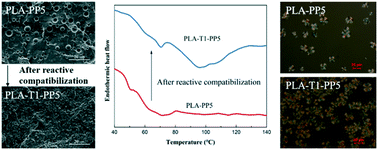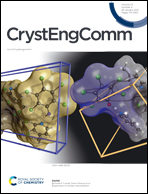The reactive compatibilization of PLA/PP blends and improvement of PLA crystallization properties induced by in situ UV irradiation
Abstract
Polylactide (PLA) is one of the most extensively utilized biodegradable and renewable thermoplastic polyesters, and it has the potential to replace conventional petrochemical-based polymers. However, the slow crystallization rate of PLA is a very essential problem restricting its application in industry. Here we report an ultraviolet (UV)-induced reactive extrusion process to prepare PLA/PP blends to improve the crystallization rate of PLA via interface-assisted nucleation. A multifunctional chemical agent, trimethylolpropane tri-acrylate (TMPTA), was adopted into PLA/PP blends, forming PLA–TMPTA–PP copolymers that can improve the compatibility of PLA/PP blends. The average particle diameters of the dispersed phases in the PLA/PP blends became smaller and more uniform after reactive compatibilization. The spherulite growth process and morphology of PLA during the isothermal crystallization process was observed by means of polarized optical microscopy (POM). The effects of reactive compatibilization on the crystallization properties of PLA/PP blends were investigated by means of differential scanning calorimetry (DSC). Compared with neat PLA, the PLA spherulite density increased obviously in PLA/PP blends. The nucleation capabilities of PLA in PLA/PP blends will increase after reactive compatibilization. This reactive extrusion method can be used as an alternative way to improve the crystallization performance of PLA.

- This article is part of the themed collection: Crystal Engineering Techniques


 Please wait while we load your content...
Please wait while we load your content...